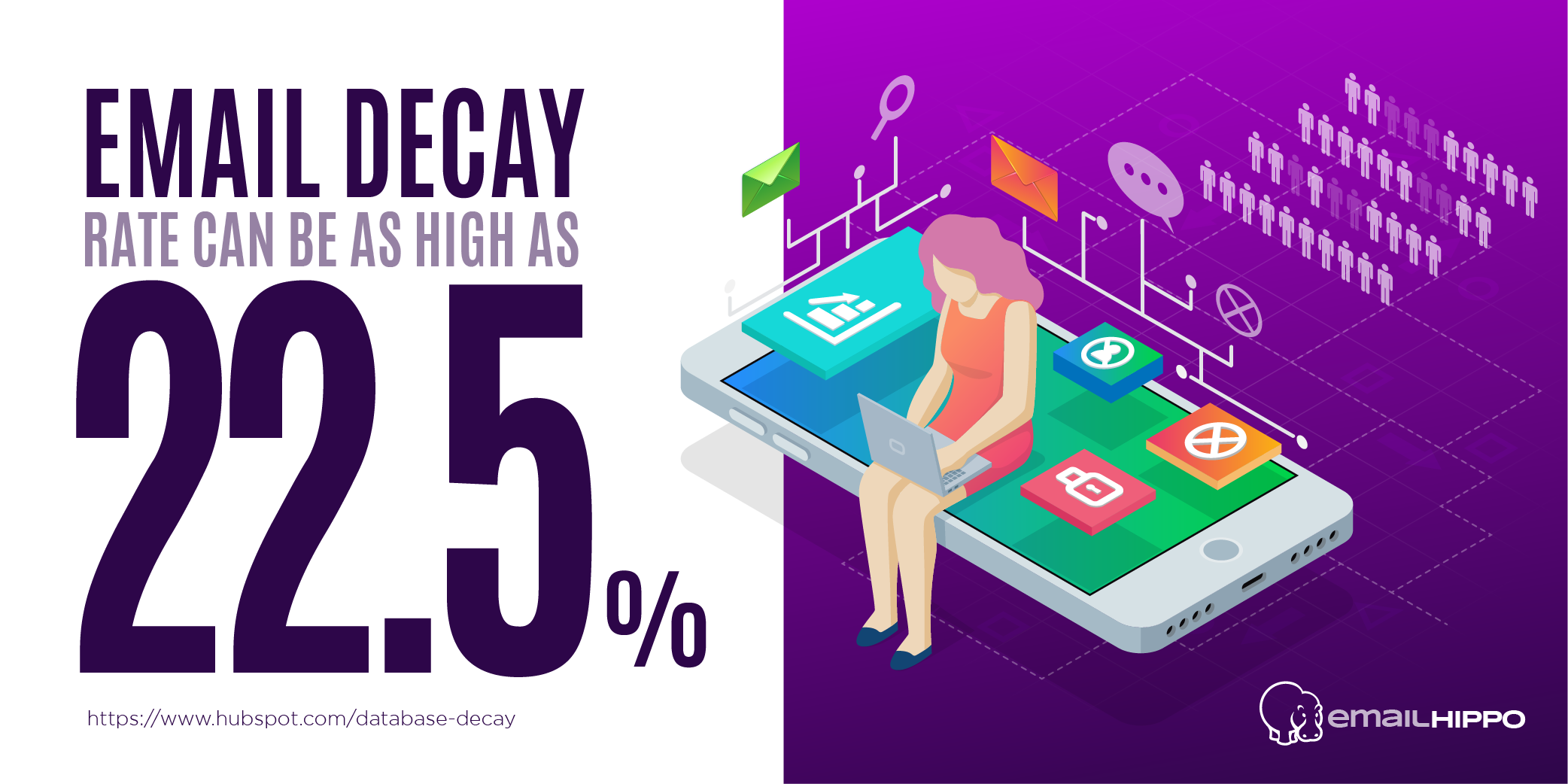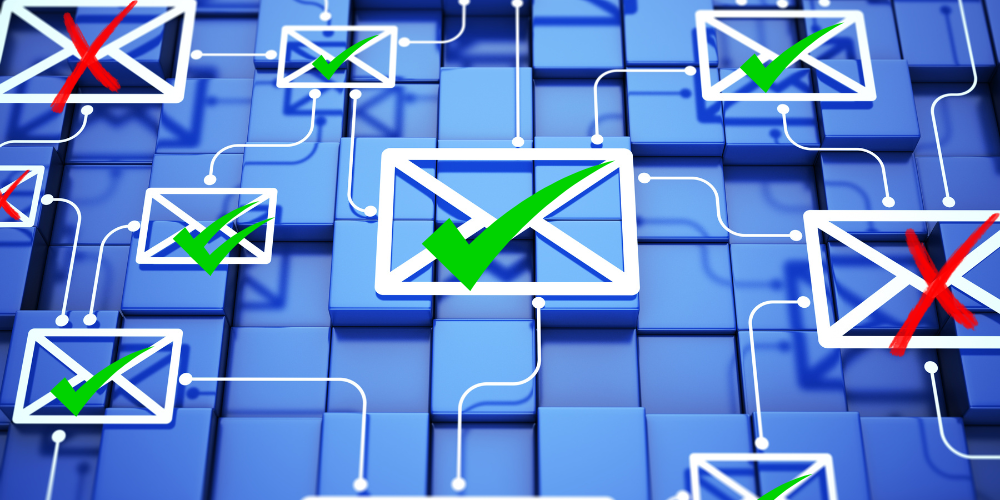.jpg?width=800&height=400&name=pexels-digital-buggu-374559%20(1).jpg)
In today's interconnected world, data has become the lifeblood of businesses and organisations, driving critical decisions, targeted marketing campaigns, and personalised user experiences. As data providers, you play a crucial role in facilitating this data-driven landscape by offering valuable information to your clients. However, with great power comes great responsibility, especially when it comes to safeguarding the sensitive data entrusted to you.
In this age of sophisticated cyber threats and privacy concerns, ensuring data security has never been more vital. One significant vulnerability lies in the accuracy and legitimacy of email addresses. Incorrect or outdated email addresses not only compromise the integrity of your data but also expose your clients to a range of risks, including data breaches, phishing attacks, and reputation damage.
Fortunately, there exists a powerful solution to address these concerns: Email validation. In this blog, we delve into the world of email validation, exploring its role in fortifying data security and how it can foster a more trustworthy and secure environment for your clients.
How does email validation play a role in safeguarding data
Email validation is a powerful tool that plays a critical role in maintaining the integrity and security of your data. It involves the process of verifying the accuracy and legitimacy of email addresses collected within your datasets. By subjecting email addresses to a series of rigorous checks and validations, data providers can ensure that only authentic and deliverable email addresses are retained in their databases.
Let's explore how email validation contributes to safeguarding your valuable data:
Preventing data entry errors
Inaccurate and mistyped email addresses are common occurrences during data collection. These errors might seem minor, but they can have significant consequences, leading to undeliverable communications and data inaccuracies. Email validation promptly identifies and rectifies such errors, reducing the chances of data discrepancies caused by typos or human mistakes.
Minimising bounce rates
High bounce rates, where emails fail to reach their intended recipients, can harm sender reputation and hinder crucial communication efforts. Email validation helps mitigate bounce rates by flagging invalid and non-existent email addresses so they can be removed before sending.. This not only ensures better deliverability for your clients but also helps maintain your reputation as a trusted data provider.
Mitigating the risk of data breaches
Cybercriminals are always on the lookout for vulnerabilities to exploit. Using fraudulent or compromised email addresses in your datasets can expose your entire database to potential data breaches and put your clients at risk. Email validation identifies and filters out suspicious or disposable email addresses, minimising the risk of malicious attacks and unauthorised access to sensitive information.
Enhancing customer data accuracy
Your clients rely on accurate data to make informed decisions. By validating email addresses, you ensure that the information you provide to your clients is of the highest quality. This accuracy fosters trust and confidence in your services, establishing you as a dependable data provider.
Detecting and preventing phishing attacks
Phishing attacks remain a prevalent threat in the digital landscape, with cybercriminals exploiting email as a primary medium for their malicious campaigns. Email validation helps detect potential phishing email addresses, such as misspelt or suspicious domains, thereby safeguarding your clients and users from falling victim to such fraudulent activities.
Building a trustworthy data ecosystem
Trust is the foundation of any successful business relationship. With a reliable email validation solution in place, you demonstrate your commitment to data accuracy and security, earning the trust of your clients and stakeholders. A trustworthy data ecosystem encourages repeat business and attracts new clients seeking a secure and reputable data provider.

Examples of common data security threats resulting from invalid emails

Data security threats arising from invalid or inaccurate email addresses can have far-reaching consequences for data providers and their clients. Let's explore some of the most prevalent risks associated with invalid emails:
Data breaches and unauthorised access
As we mentioned above, including invalid or improperly validated email addresses in your datasets opens the door to potential data breaches. Cybercriminals can exploit these vulnerabilities to gain unauthorised access to sensitive information, compromise user accounts, and steal valuable data. A single compromised email address can serve as a foothold for hackers to infiltrate an entire network, resulting in severe financial and reputational damage.
Phishing and social engineering attacks
Invalid email addresses, especially those that belong to disposable or temporary domains, are often used by malicious actors for phishing and social engineering attacks. These deceptive emails are crafted to mimic legitimate organisations or individuals, tricking recipients into revealing confidential information, such as login credentials or financial data.
Falling victim to such attacks can lead to financial losses and reputational harm for both the affected users and the data provider associated with the compromised email.
Compromised reputations and lost trust
Inaccurate email addresses can result in emails being sent to unintended recipients or even marked as spam. This can damage the reputation of the data provider, leading to decreased trust among clients and users. Diminished trust can significantly impact the provider's ability to retain clients and attract new business opportunities.
Wasted resources and inefficient operations
Storing and maintaining invalid email addresses in your database consumes storage space and computing resources unnecessarily. Additionally, data analysts and marketing teams may spend valuable time and effort attempting to engage users with inaccurate contact information, diverting resources from more productive endeavours.
To mitigate these common data security threats, data providers must prioritise the implementation of robust email validation solutions. By ensuring the accuracy and legitimacy of email addresses, providers can fortify their data against potential risks, protect their clients' sensitive information, and foster a secure and reliable data ecosystem.
How email validation helps to maintain a clean and reliable database
A clean and reliable database is the foundation of any successful data-driven operation. Email validation plays a crucial role in achieving and maintaining such a database by ensuring that only accurate and legitimate email addresses are retained. Here are some of the key ways in which email validation contributes to database cleanliness and reliability:
- Eliminating invalid and typo-ridden entries: Email validation employs a series of checks to identify and remove invalid email addresses, such as those with syntax errors, missing components, or incorrect formats.
- Verifying email address existence: Through various validation techniques, email validation determines whether an email address actually exists and can receive messages.
Take the first step towards optimising your operations by automating the crucial task of email validation - Download our guide
The role of email validation in protecting users' sensitive data
Email validation plays a crucial role in safeguarding users' sensitive information in today's data-driven landscape. By ensuring the accuracy and legitimacy of email addresses, data providers protect their clients and users from potential data breaches, phishing attacks, and identity theft.
Email validation helps prevent unauthorised access to sensitive data by filtering out invalid and suspicious email addresses from databases. By identifying and eliminating disposable or temporary email addresses, email validation reduces the risk of fraudulent activities and ensures that only genuine users are granted access to sensitive information and services. This not only enhances data security but also reinforces users' trust in the data provider's commitment to their privacy and protection.
Moreover, email validation contributes to a seamless user experience by minimising undeliverable communications and ensuring that important information reaches its intended recipients. This proactive approach to protecting users' sensitive information establishes data providers as reliable and responsible custodians of data, fostering long-term relationships based on trust and security.
The importance of email validation in preventing unauthorised access to sensitive data

Invalid or fraudulent email addresses can serve as gateways for cybercriminals to exploit vulnerabilities within a system, leading to unauthorised data access and potential data leaks. Email validation helps mitigate these risks by filtering out suspicious email addresses, including disposable and temporary ones, which are often associated with malicious activities. This proactive approach reduces the likelihood of fraudulent account registrations and unauthorised access attempts.
In an era where data breaches can have severe consequences, the importance of email validation in preventing unauthorised access to sensitive data cannot be overstated, making it a critical element of a robust data security strategy.
How Email Hippo helps data providers keep data secure
In the pursuit of building a trustworthy and secure data ecosystem, email validation emerges as a fundamental pillar for data providers. Email Hippo plays a pivotal role in helping data providers keep their data secure and protected.
Our advanced validation techniques detect and eliminate invalid, mistyped, and suspicious email addresses, reducing bounce rates, preventing fraudulent activities, and enhancing overall data quality. By ensuring that only accurate and legitimate email addresses are retained, we can help you maintain a clean and reliable database, promoting efficient communication with clients while minimising the risk of data breaches and unauthorised access.
Moreover, our email validation solution facilitates compliance with data protection regulations, ensuring that users' sensitive information is handled responsibly and transparently, further reinforcing the data provider's commitment to data security and privacy.
With Email Hippo as a robust partner in the fight against cyber threats, data providers can confidently navigate the data-driven landscape, instilling trust, reliability, and integrity into their services and solidifying their position as leaders in the realm of data security.
When it comes to data management, email validation plays a vital role in maintaining data integrity. It verifies the authenticity and deliverability of email addresses, keeping your data secure. To find out more, download our guide: Automating email validation with Email Hippo.

.png)


.jpg?width=800&height=400&name=pexels-digital-buggu-374559%20(1).jpg)





